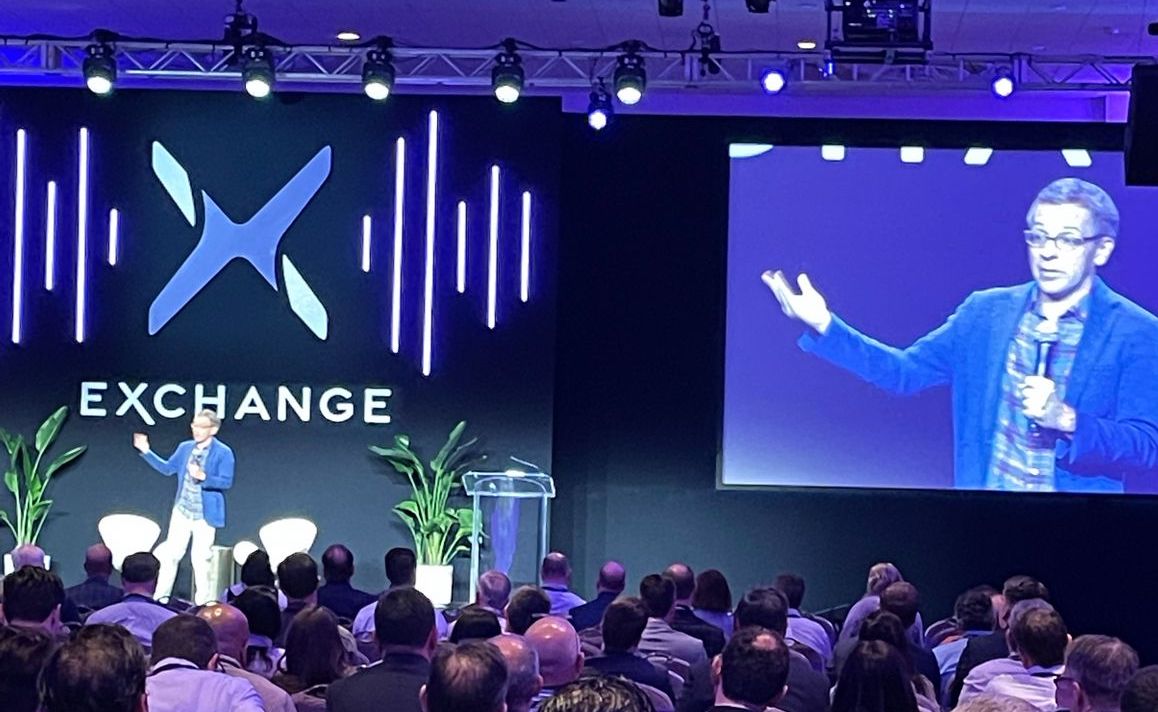Geopolitics came back to the fore of investors’ minds last year in almost the biggest way possible with Russia’s invasion of Ukraine. The invasion has thrown global energy and commodities markets for a whirl, and the future of Ukraine and Europe overall is in the balance. Geopolitics is more than just Europe and more than just wars, though, and it was the focus of Monday morning’s “Geopolitical Recession” talk from Eurasia Group founder and author Ian Bremmer at Exchange in Miami.
Taking the audience around the world in 60 minutes, Bremmer focused on three key buckets: rogue states, challenges for emerging markets, and the resilience of democracies. Author of “Every Nation for Itself: Winners and Losers in a G-Zero World,” Bremmer explained his idea of a “geopolitical recession,” in which there are boom and bust cycles in geopolitics just like in economics.
In such a geopolitical recession, the existing balance of power has moved past the world’s existing institutions — such as the U.N. Security Council. Russia is still a member, thanks to being on the winning side in World War II, but it has become a rogue state and uses its leverage on the council to stymie global cooperation in response to crises, some of its own making. Instead, nations that support global liberal institutions like Germany and Japan and are global pillars themselves are left out in the cold.
“When the balance of power shifts so much that it’s no longer aligned with those institutions, therefore the institutions start to break. You get a geopolitical recession,” he added. “In response, you get a lot of geopolitical crises. And in response to the crises, you finally start adapting, or creating new institutions, which allows you a new boom cycle. That’s where we are right now.”
That has left the door open for even individuals to exert significant power — not only leaders of nations with total institutional control, like Vladimir Putin and Xi Jinping, but also tech leaders like Elon Musk, CEO of Tesla (TSLA) and Twitter.
“I mean, if it weren’t for Elon Musk and Satya Nadella, I don’t think [Ukrainian President Volodymyr] Zelensky’s still in power right now,” Bremmer said. “The decisions they made in the first couple days after the Russian invasion of Ukraine were far faster, far more impactful than anything the NATO governments were doing because the NATO governments thought that he was going to fall.”
A Red Lashing
Turning to Russia, Bremmer cited his concerns that an isolated Russia might lash out.
“What we saw last February was the biggest miscalculation of any global leader on the world stage since the wall came down in ’89,” Bremmer said, suggesting that Putin saw a weakened NATO as a possible invitation and the possibility of China’s backup.
His miscalculation, he said, also came due to his belief that Ukrainians wouldn’t fight back and his army was better than it actually is, because he has not gotten good information from yes-men surrounding him.
Bremmer added that as the situation worsens in Ukraine, Russians will see the war even more as being between NATO and Russia, with Russian cyberattacks growing against institutions like derivative markets in Europe and backing far right candidates in the West.
“I don’t think there is any way we can keep this war contained to Ukraine,” Bremmer said, expressing significant concern that Russia, detached so significantly from the West, is positioned as perhaps the most powerful rogue nation in history.
Some suggested that China had become “uninvestable” following Premier Xi Jinping’s centralization of power at the 20th Party Congress last year. Bremmer pointed to Jinping’s removal of term limits and use of anti-corruption laws to tighten his grip, limiting data from China.
Looking for a China Spike
The move from “Zero-COVID” to a full opening, Bremmer said, has offered an example of the data reporting being questionable. But thanks to the opening, he said, Chinese growth should spike with supply chains moving.
“We don’t want China to collapse. We need a robust Chinese economy,” Bremmer said of geopolitics in the U.S. and China relationship. “But one thing we’ve able to say about China in the last few years is when they implement a decision, they execute it well.”
“That’s going away, because Xi no longer has those checks on his internal authority. He’s running the country in a very dictatorial fashion.”
Bremmer said that this would create more risk in the Chinese economy but would drive things like energy prices higher globally as the country reopens.
The Chinese spy balloon, which recently entered American airspace and dominated the news, came amid a Chinese charm offensive, Bremmer said, which indicates that either Jinping didn’t know about it, or he did know and was told it wouldn’t be a problem given that recent balloon appearances were perhaps less noticeable.
“Biden wanted to proceed with the [Secretary of State Anthony Blinken] meeting with China,” Bremmer said. “But as soon as it became public, Biden can no longer do that, because everyone’s saying… you’ve got to be tougher.”
The underlying U.S.-China relationship is more stable than people think, Bremmer said, noting that not only does the private sector largely want to do business as usual in China, but almost every American military ally wants a stronger military relationship with the U.S. along with a stronger economic relationship with China.
A Global Gap
Bremmer then turned to the growing gap between the West and the Global South. The dynamic that saw investors plow money in to emerging markets with an added benefit of a “global middle class” turned the other direction during the pandemic, he said, with inflation driven by the rich countries of the world, along with the Russian invasion as an added challenge.
“The emerging markets, the developing countries, are the ones least capable of handling those challenges,” he said, adding that so many developing countries don’t support the West in Ukraine because Western countries are only willing to spend on things like vaccines for themselves while the impact of climate change is set to be borne so disproportionately by developing countries, with climate change being driven so much by the developed, already-industrialized nations.
That’s driven nations like India to continue trade with Russia, for example, further agitated by the difficulties facing certain segments of the emerging markets space.
“We’re going to see the non commodity-producing emerging markets in the most trouble. They’re going to be feeling this pain, and as that happens they’ll either respond with their own populist, protectionist policies, or they’ll be forced out of office,” he said, pointing to Latin American nations apart from Mexico — like Brazil, Peru, and Colombia — nations in Asia including Pakistan, along with Egypt and much of sub-Saharan Africa.
“This pressure is going to create much more anger between the emerging markets, the Global South, and the West,” he said of geopolitics in emerging markets. “So the G-7 is getting stronger. NATO is getting stronger. The EU is getting stronger, politically. But globalization is fragmenting, it’s adrift. And developing countries see the industrial policies being developed by the U.S. and its allies on energy transition and semiconductors, and they feel like they want no part of it.”
Having offered two negative buckets, he did offer a third, positive bucket, in which democracies are more resilient now than perhaps many had thought. The U.S., he said, has managed to survive domestic crises after January 6, and there was also the European Union’s response to Brexit.
“The largest experiment in supranational government in the world is dramatically stronger thanks to these crises,” he said of the EU. “They have stronger health policy, stronger energy policy, stronger fiscal policy, stronger defense policy, and stronger data and tech privacy policy.”
Strengthening Where One Can
Bremmer shared an anecdote from Greece’s prime minister, with whom he recently met, in which the leader expressed how hard it had been to get the EU together between a northern and southern Europe on challenges like the European fiscal crisis, but now money has transferred far more easily from the pandemic, meaning that there has been far less willingness from Hungary and Poland to bicker with the EU.
“No one talks about Frexit in France except for the renamed National Front….because they’re facing a war on the continent. So Europe is stronger,” said Bremmer.
Biden and Trump even appear broadly similar on China, he said, explaining that Democrats and Republicans both see Putin and China as bigger adversaries than each other, with more coordination outside the headlines in Washington than one might think. Still, the U.S. has enormous political dysfunction, with the debt limit approaching this summer.
“We probably will not suitably respond to the debt limit until there is a market reaction.” Bremmer said. “It’s not dysfunctional in a way that implies that it might become an authoritarian state or that we might see an actual coup.”
Even Brazil, he said, saw a recent weak attempt at a “January 6 moment” fail, with “zero percent chance” of overthrowing the democracy. January 6 was horrible and embarrassing and represents a hugely dysfunctional government, Bremmer said, but had no chance of success.
For more coverage of the Exchange conference, please visit VettaFi | ETF Trends


